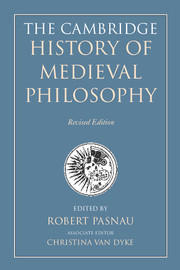Book contents
- Frontmatter
- Contents of Volume 1
- Preface
- List of contributors
- Frontmatter
- Contents of Volume 2
- Introduction
- I Fundamentals
- II Logic and language
- III Natural philosophy
- IV Soul and knowledge
- V Will and desire
- VI Ethics
- VII Political philosophy
- 39 Religious authority and the state
- 40 Individual autonomy
- 41 Law and nature
- 42 Poverty
- 43 Just war
- VIII Metaphysics
- IX Theology
- Appendices
- Bibliography of primary sources
- Bibliography of secondary sources
- Index nominum
- Index rerum
- References
40 - Individual autonomy
from VII - Political philosophy
Published online by Cambridge University Press: 05 August 2014
- Frontmatter
- Contents of Volume 1
- Preface
- List of contributors
- Frontmatter
- Contents of Volume 2
- Introduction
- I Fundamentals
- II Logic and language
- III Natural philosophy
- IV Soul and knowledge
- V Will and desire
- VI Ethics
- VII Political philosophy
- 39 Religious authority and the state
- 40 Individual autonomy
- 41 Law and nature
- 42 Poverty
- 43 Just war
- VIII Metaphysics
- IX Theology
- Appendices
- Bibliography of primary sources
- Bibliography of secondary sources
- Index nominum
- Index rerum
- References
Summary
Some readers may find it surprising to encounter a chapter on “individual autonomy” in a survey of medieval philosophy, especially in connection with political philosophy. After all, an established tradition of historical scholarship insists that the Middle Ages was a period in which hierarchy, interdependence, and communal holism were emphasized to the virtual exclusion of the individual. The recovery of Aristotle’s writings on ethics and politics during the course of the mid-thirteenth century would seem only to reinforce the generally “communitarian” and anti-individualistic orientation commonly ascribed to medieval thinkers. Recently, the image of medieval Europe as hostile to the individual has been reaffirmed by its depiction as a “persecuting society.” Thus, according to the conventional view, the Renaissance and the Reformation constituted the watershed for the appearance of the individual as a moral and political category worthy of philosophical consideration.
Yet medieval political thinkers, both before and after the dissemination of Latin translations of Aristotle’s work, were surprisingly attuned to the standing of the individual and the role of free choice in public affairs. In their emphasis on the centrality of private property and consent to government, as well as their insistence on the ability of individuals to enjoy forms of personal liberty (such as free thought, judgment, and speech), these authors resisted the supposedly hierocratic (even authoritarian) tendencies that scholarship often ascribes to the Middle Ages. In turn, the ability of high and late medieval writers to establish a firm grounding for the individual in relation to religious as well as political authority depended upon their access to a wide range of pagan and Christian sources that yielded philosophical and theological principles supporting personal autonomy. For example, the political and legal traditions inherited from Rome endorsed such values as liberty, philosophical skepticism, and economic freedom.
- Type
- Chapter
- Information
- The Cambridge History of Medieval Philosophy , pp. 551 - 564Publisher: Cambridge University PressPrint publication year: 2014



